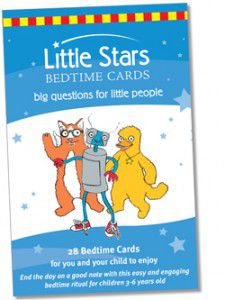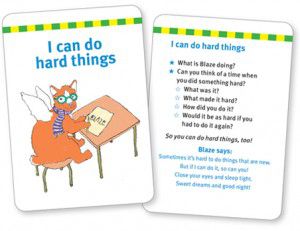 Every night before sleep, my son comes out with the most profound observations, and I cherish the time where we discuss the ups and downs of his day. I’ve even noticed him waiting, clingy and quiet, until bedtime, and then spilling the beans.. “Nick made me feel bad today”. “Guess what.. the teacher said that she was really proud of me for counting to ten.” If I miss a couple of bedtimes, I suddenly feel disconnected. But not all nights are easy, and the kids don’t always know how to express themselves. That’s why we love Little Stars Bedtime Cards. Given to me by a dear friend (and an amazing parent), these are designed to affirm positive qualities that already exist in your child. They help you to go beyond teaching and telling, to engaging and connecting with your child through the sharing of common positive experiences and emotions.
Every night before sleep, my son comes out with the most profound observations, and I cherish the time where we discuss the ups and downs of his day. I’ve even noticed him waiting, clingy and quiet, until bedtime, and then spilling the beans.. “Nick made me feel bad today”. “Guess what.. the teacher said that she was really proud of me for counting to ten.” If I miss a couple of bedtimes, I suddenly feel disconnected. But not all nights are easy, and the kids don’t always know how to express themselves. That’s why we love Little Stars Bedtime Cards. Given to me by a dear friend (and an amazing parent), these are designed to affirm positive qualities that already exist in your child. They help you to go beyond teaching and telling, to engaging and connecting with your child through the sharing of common positive experiences and emotions.
The questions are very suggestive and feature great characters that kids get to know and bond with. One card has a cat named ‘Blaze’ stating that he can do hard things. On the back of the card, the parent is guided through questions such as “Can you think of a time when you’ve done something hard?”
As stated on the Little Stars website, “the cards are used over and over again, as children want to revisit their favorites or those that have particular meaning for them. You may notice that as you child grows, new meaning can be found in the cards each time they are shared. The cards are easily adapted and so you may find that there are times when you choose a card that may help to facilitate discussion on a particular topic.”
“Big questions for little people” is a very important concept. When we have a specific lesson or message that we need to communicate, teaching or telling our child is very effective. However, when the goal is to connect and deepen our understanding of our child, questions about thoughts and feelings can be incredibly effective for the following kinds of reasons:
- It becomes a two way conversation
- It feels good when someone takes and interest you (even if you don’t have a lot to say)! The very nature of asking questions is an expression of the desire to learn about the other person
- There are no right or wrong answers when you are talking about thoughts and feelings
- Your child will feel loved knowing that you care enough to ask the question and to listen to their response (again even if they don’t have a lot to say)
- You see the world through your child’s lens and may end up talking about things you wouldn’t otherwise (you may be surprised to learn just how opinionated and observant your three year old really is!)
- It keeps your attention focused on your child and children love to have a parents undivided attention even for just a short while
- Children are naturally curious and while they love to answer questions, they may start to ask questions themselves which is lots of fun too.
Anything that gets them talking and sharing. Um… will there be a set for teenagers?
– Jill Amery really likes it when her kids share, and usually she can’t even get a breath in edgewise.




